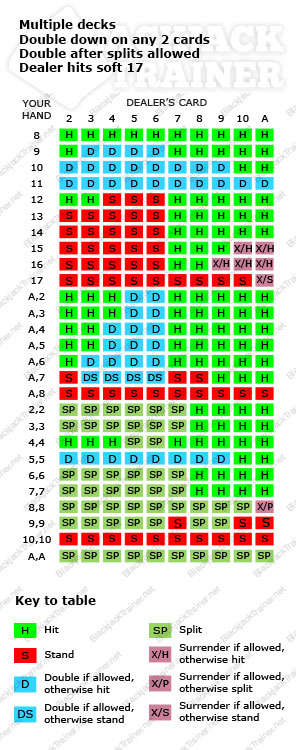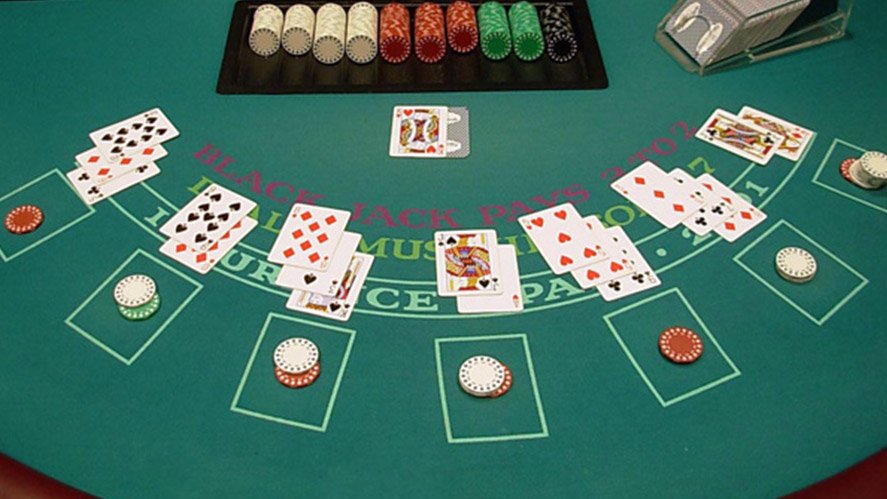When Does Dealer Hit In Blackjack


Table Etiquette
Although the game itself is simple, there are casino rules and traditions that are important to follow in order to avoid a reprimand from the dealer.
Sometimes this is no registration free spins for existing When Does The Dealer Have To Take A Hit In Blackjack players or just a simple free cash bonus.
- Once you've place your bet, don't touch the chips. The dealer might think you're trying to sneak extra chips into your bet because you have a good hand.
- If you're doubling down, place the additional chips next to the original chips that you bet, not on top of them. The dealer doesn't always count your bet ahead of time, so he might think you're adding more than double to your bet when you mix the two together.
- In a London Deal game, in which you get your cards face up, do not touch your cards. Casinos prohibit this to prevent players from marking the cards in some way.
- If you're playing Nevada Deal, you'll have to pick up your cards to look at them. Never touch them with two hands, and don't handle the cards more than necessary. Always keep them above the table, in plain sight.
- Making your play at a blackjack table is not quite as simple as telling the dealer, 'Hit me,' or 'Stand.' In a crowded, noisy casino, it would be very easy for the dealer to misunderstand what you say, or hear the play at another table and think it was yours. That's why hand signals are required.
- The dealer's eyes will be on the cards almost all the time. When you want another card, say, 'Hit me,' and make a brushing or scratching motion behind your cards. (If you're holding your cards, you can brush them against the table behind your bet.) Imagine that you're making a slight, subtle, upside-down 'Come here' motion, and you'll get the idea.
- The signal for standing is a small wave of the hand while saying, 'Stay,' or 'Stand.' Imagine that someone has just offered you a large slice of pie, but you just ate and you're stuffed. That 'No, thanks' hand motion is similar to the signal for stand. (Alternately, slide your cards face down under your bet.)
- In most casinos, the dealer is required to hit on hands worth less than 17 points, regardless of the cards that make up their hand. Hands worth 17 points, however, can’t be hit on. If you’re playing as the dealer and your hand is worth 17, 18, 19, 20 or 21 points, you can’t hit any further and need to stand with whatever hand you’ve got.
- Each new card you receive from the dealer is considered on hit. In other words, you cannot hit your hand for two cards as you can in draw poker. Whenever you hit your hand you receive one card and then you may choose to hit again or stand on your total.
- If the total of the cards exceeds 21 at any point, the player is bust and loses the hand. This is where the player gives up half his bet to forfeit the hand.
- It's vital to pay attention at the table. One story goes: A gambler looked away for a brief moment when a waitress asked if he wanted a drink. He inadvertently left his winnings from the previous hand in the betting circle (a substantial amount), and turned around to find the dealer had dealt him in with a $500 bet. Before he had a chance to complain, he glanced down to find he had been dealt a natural blackjack. That was a surprise happy ending, but his inattention at a key moment could easily had led to a huge loss.
- Tipping the dealer, known as toking, is customary but not required. The usual practice is to place the chips you're tipping with on the edge of the betting area between you and the dealer. You're actually betting the tip for the dealer. If you win the hand, the dealer gets twice the tip. If you lose, the dealer gets nothing.
- It's a good idea to exchange your cash for chips at the casino's cage before you start playing. However, there is usually a cash box at the blackjack table. You can place the money you want to play with on the table, and the dealer will exchange it for chips. In some casinos, you might even be allowed to bet with cash, but your winnings will be returned as chips. The dealer can't and won't change your chips back into cash -- it's back to the casino cage for that. The dealer will, however, allow you to trade in stacks of small-denomination ships for larger-denomination ships.
Now you know how to play blackjack. Next, we'll learn how to win.


Advertisement
Advertisement
When you play blackjack, you have some incomplete information to base your playing decisions on. You know the value of your two cards and you know the value of the dealer’s up card. You don’t know what the dealer’s hole card is and you don’t know what the next card out of the shoe will be. However, if you use basic strategy when you play, you can make an accurate decision based on just the information that you do know.
Basic Strategy
Basic blackjack strategy is based on the mathematics of the game. It has been tested and refined through computer simulations. When it is followed correctly, it reduces the house edge to the minimum, which is usually about one-half of a percent. When you use basic strategy, you make your decision to hit, stand, or double down based on your two cards and the dealer's up card. Many players wonder what percentage of time will the dealer bust based on their up card. (Whenever your hand or the dealer’s hand goes over the total of 21, it is called a bust.)
The dealer will bust more often with certain up cards than with others. Take a look at the chart below. You will see that the worst cards for the dealer are the 5 and 6, followed closely by the 4. When the dealer is showing a 5 or a 6, they have a 42 percent chance of busting and a 40 percent chance when they have a 4 showing. This is why you double down more often when the dealer is showing a 4, 5, or 6.
When Does A Dealer Have To Hit In Blackjack
The cards where the dealer is least likely to bust are the Ace, 10, and 9. When the dealer has one of these cards showing, they also have another advantage since the player has to act first. According to basic strategy, a player with a hand of less than 17 will need to take a hit when the dealer is showing a 7, 8, 9, 10, or ace. If the player busts, he loses the hand even if the dealer also busts, so the percentage of times the house will win is greater than just the bust percentage shown in the chart.
Play Correctly
You will make more money when the dealer is showing a card that will allow you to double down, however, you must follow the rules of basic strategy. Many novice players will double down with a hand of 7 or 8 against a dealer showing an up card of 5 or 6. This is not correct and even though the dealer will bust 42 percent of the time, you will lose more money if you don’t play according to basic strategy.
Knowing the dealer’s bust percentage is useful information but it should just be used to confirm the decisions you make when you play basic strategy. If you are unsure of the correct plays, you should memorize the basic strategy chart or bring one to the table with you. This way, you will be playing blackjack with the lowest house edge possible.
